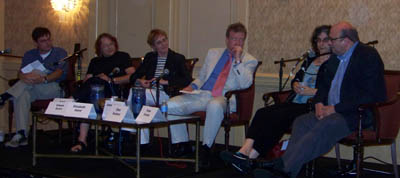Readercon 20: Thursday, July 9th
Up at 6 this morning to finish packing the car. Unfortunately, we didn’t get underway until a bit after 8 so the schedule was trashed from the beginning. It’s an 11 hour drive from our house to the Marriott Hotel in Burlington, MA. Of course that includes a few stops along the way. So, it had already been a long day when we got here and checked in. Then we searched out food and tried to get to the evening panels.
Readercon started having panels on Thursday night a couple of years ago. These panels are open to the public which means people can come to see a panel or talk and decide if they want to come back and pay for the membership to attend the rest of the weekend’s events.
8:00 – Writers Who Review. Panelists: Michael Bishop, Paul DiFilippo (leader), Elizabeth Hand, Barry N. Malzberg, Howard Waldrop, Gene Wolfe. The reviewers in our field have often also been writers: Judith Merril, Damon Knight, Algis Budrys, James Blish. Does being a writer/critic inevitably affect the practice of both arts? Or are the required skill sets sufficiently different that doing one has surprisingly little influence on the other? Our panelists look at the careers of the greats and talk about their own experience as two-way players.
Unfortunately, in our quest for food we missed most of this panel. I think we managed the last ten minutes. Where the panelists were basically agreeing that even though the time spent reading the books and writing the reviews took time away from their own writing, it was worth it. Waldrop said that one year when he was doing his taxes he realized that over half his income was from nonfiction writing which included reviews. Hand said that often, in the past, reviewing was a way to earn money between writing projects. The last five minutes of the panel was spent answering questions from the audience.
During this time period there were two other panels and four half-hour readings.
 9:00 The Origin of Character in the Breakthrough of the Bicameral Mind. Panelists: Daryl Gregory, Eileen Gunn, Elizabeth Hand, James Patrick Kelly (leader), Ellen Kushner, Peter Straub. Our panelists all report the experience of their characters “taking over” the story and behaving in some way autonomously. But we wonder whether this is actually multiple different psychological phenomena rather than a single one that everyone shares. So, we’ve asked them to compare notes.
9:00 The Origin of Character in the Breakthrough of the Bicameral Mind. Panelists: Daryl Gregory, Eileen Gunn, Elizabeth Hand, James Patrick Kelly (leader), Ellen Kushner, Peter Straub. Our panelists all report the experience of their characters “taking over” the story and behaving in some way autonomously. But we wonder whether this is actually multiple different psychological phenomena rather than a single one that everyone shares. So, we’ve asked them to compare notes.
Kelly started the panel off by giving a one minute overview of Julian Jaynes book, The Origin of Consciousness in the Breakdown of the Bicameral Mind. (Check out the link for the reviews on Amazon). Basically, Jaynes was discussing the history of the conscious (recent) and unconscious mind and how many of our actions are unconscious (breathing, walking, and some problem solving?).
The panelists then discussed writing as a conscious/unconscious process. Most gave examples from their own experiences when a story or character just came to them. Sometimes it was writing a story and having a minor character show up and then finding that that was actually the main character and the story took off in a different — though usually more interesting — direction. They also discussed “gift stories” or the stories that seem to just appear full blown and it is a race to get it down before it’s gone.
Gregory said that he really gets upset when people say the “book wrote itself” because he has to do fourteen drafts. He also said that often it isn’t until he’s really worked on it and maybe is into the second draft and the characters have gelled until he begins to find that the story wants to go in another direction and that usually comes out as he works on dialog.
All the panelists said it was important to listen to that inner voice because you could trust it. It might not be perfect but it would get you in the right direction.
Kushner said that often if you can get a person to rapid fire questions at you about your character and you have to answer without thinking about it you’ll find the direction and information you need to take the story where it needs to go.
There was much discussion about the creator/critic dichotomy in writing and that it was important to write without the critic to get a first draft.
This panels was very lively and managed to enthrall the audience. The questions period was taken up with asking about how do you recognize the inner voice that’s helping versus the very loud voice that’s just self-doubt. Basically, if it’s not helping you then it’s most likely self-doubt because that inner voice is usually trying to help you.
In this time slot there were two other panels and four readings.
Hyperion attended the reading by Michael J. Daley author of Rat Trap and Shanghaied to the Moon (YA). [Hyperion: Michael said that his newest book has had its publishing date pushed back to 2011.]
Tomorrow is a full day of programming so we’re calling it quits so we can get some sleep.




